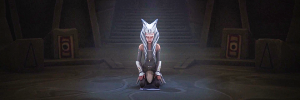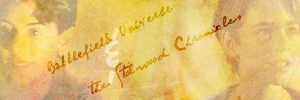Hey guys!
I was reading HHB (my favorite of the Chronicles) and when I got to the chapter Rabadash the Ridiculous I came across some statements that made me think:
"Now here me, Rabadash," said Aslan. "Justice shall be mixed with mercy. You shall not always be [a donkey]...You have appealed to Tash, and in the temple of Tash you shall be healed. You must stand before the altar of Tash in Tashbaan at the great Autumn Feast this year and there, in the sight of all Tashbaan your [donkey's] shape will fall from you and all men will know you for Prince Rabadash. But as long as you live, if ever you go more than ten miles away from the great temple in Tashbaan you shall instantly become again as you now are. And from that second change there will be no return."
I've been thinking about what this punishment represents from a Biblical standpoint, and the only options I could think of were Cain's punishment for the murder of Abel in Genesis, and the Devil's entrapment in the bottomless pit in Revelation, and short release from it after a thousand years passing.
Any thoughts on which of these it would be, or other ideas?
-Andy
5.9.2011 the day Christ saved me!

Thank you Lady Faith for the sig!
I'm not sure this one is meant to be spiritual, or to represent Biblical ideas, except perhaps that when God punishes, He does so to teach, correct behavior, and protect, not to simply cause pain to the transgressor. Rabadash's punishment was not physically painful, but would make an impression on a proud young man who "couldn't bear being made ridiculous". We know it made him a better king, which was a relief to his people and the surrounding nations.
How about Aravis' punishment? It was not a direct consequence either- just like Rabadash's.
The fact that it was handed out directly by Aslan Himself and that only Aslan states why makes me wonder if C.S. Lewis was tired of seeing people passing judgment on other people when bad things happen. That only God can decide who deserves what to happen- not us humans. That we should not be saying that something bad happening to someone we dislike is "karma" (or worse- divine punishment)- and that we certainly should not be gloating about it.
After all, in another book that Narnia was inspired very much by, the Protagonist of the second half said things about "not judging".
Andrew, just quick thoughts without reflection: Nebuchadnezzar - wasn't punished!
In the practical aspect, by the laws of war, Rabadash's life might well be forfeit, for starting a war unannounced. Given the political embarassment, there "might" not be much desire on the part of his country in ransoming him at all. A more likely fate: to be ransomed, and then locked in a tower for the rest of his days until a younger price took his throne and had him liquidated. But for the Archenlanders, there's always the risk of provoking a much larger adversary by punishing him too much. Making him look foolish serves a political end, without the attendant risks.
That he was allowed to take the throne is a line of further enquiry. The tisroc could easily have deemed him unfit and had him removed.
The juridical aspect is a tougher nut.
Many receive death that deserve life, others live that deserve death. Aslan's "mercy" was in giving the young man time to reflect on the journey back to the temple. The punishment was lifetime imprisonment within the vicinity of the city, not unlike the injunction on Adam and Eve about the fruit of knowledge. - He could easily have made war or mounted defense of his realm from home- ie, ruled as a tyrant. That he did not says that he was not only obedient to the ban placed on him, (Galadriel? Coriakin? ) but also repented of his former self. Given that many are horribly maimed in combat, being bound to 6 leagues from home isn't much of a battle-scar.
That later generations called him "the Ridiculous" says more about the culture than about his reign. Was he ridiculous for looking like an ass? Or for not being a warmonger like other Great Leaders?
While bound in asses form, he like the father of John the Baptist, was rendered speechless, like Nebuchadnezzer he would eat grass and be wet by the dew (well, we hope he got better treatment, but who knows what tastes he developed). There are your parallels. They tell you little, but we KNOW that Nebuchadnezzar was no man to EVER be laughed at! He was not shamed by God. He was HUMBLED, he was brought low. In the end he praised God, for to be saved by the gods is not shame but an honour! All the moreso as it was not deserved.
Was it punishment? Mercy? or Grace?
We dont know enough about what happened to Cain to know how he took his medicine. Neither do we know what "might have been" or what he Lost by his actions. And as for the devil, well, that's not in the same league - like asking what the "final end" of the White Witch, of Sauron, of Morgoth. Tolkien's hints are only ever so slightly scented of heresy, Lewis says little.
I think Aslan showed mercy in this case--and the fact that he couldn't go far away from Tashbaan was better for the other nations. But like Nebuchadnezzar, it was a case of humbling pride. And since he was more afraid of looking ridiculous than he was of dying, make him look ridiculous was therefore a worse punishment.
The glory of God is man fully alive--St. Iraneus
Salvation is a fire in the midnight of the soul-Switchfoot
Sorry for the late reply, Andrew.  School has kept me very busy and I haven't had time to think out a good reply (even now I'm not sure if what I'm about to say will make complete sense).
School has kept me very busy and I haven't had time to think out a good reply (even now I'm not sure if what I'm about to say will make complete sense).
I don't think Rabadash's punishment really compares to either Cain's or Satan's. Cain was cursed, and Satan was imprisoned. Rabadash was simply made a fool. I suppose because he can't leave Tashbaan it might be considered a sort of imprisonment, but I don't think it really compares to the bottomless pit.
I think Lady Haleth is on the right track. Nebuchadnezzar thought he was the greatest man on earth, and God humbled him. Daniel warned him, but he would not listen. Even though Nebuchadnezzar saw the power of God multiple times he did not listen. Rabadash was offered mercy, but he did not take it. Aslan warned him, but he would not listen. Rabadash was made a donkey; Nebuchadnezzar became like an animal. In the end, Nebuchadnezzar acknowledged God as the Most High, but I don't think Rabadash ever acknowledged Aslan.
I think Morna summed it up nicely. I couldn't have phrased it any better myself! And as she said it so perfectly the way I think it, there is no use for me to try to explain it as well. I'd only goof it up.
And remember, Andrew...
The Chronicles, by Lewis' own admission, are not allegories. (there is an exact, and rather lengthy quote pertaining to that. you can find it several places online) But rather, suppositions. "Suppose God came to a place like Narnia, how would things go? How would it be similar to what has happened here?" (I can't remember the exact quote, but that's basically what it meant. These are MY words, not Lewis'. But you can easily find the real quote elsewhere) Not everything in the books will have a parallel.
They are just good stories, that came from images in his mind. If God happened to allow some things to seep in, that's not because Lewis planned it that way, necessarily. But, because, as Lewis himself said... "I believe in Christianity as I believe that the sun has risen: not only because I see it, but because by it I see everything else."
I'm a writer too, and basically how I see it, and how I think Lewis saw it, is this: I'm a Christian. I don't set out thinking "Oh, I'm going to make my story about God." or "How can I teach people certain things?". It's more like, if it becomes a part of the story, it's because it's part of who I am, and reflects in every aspect of my life. Not to mention, I've heard people mention that there is no new story under the sun. All stories will have similiarites. It's just how things work, I guess.
My point is, I know it's fun to analyse the books. But sometimes, I think we search for (or see) things that aren't really there. Some things are (the death and resurrection of Aslan being the most obvious link). But that doesn't mean all instances, characters, or books have an exact piece of the Bible to look for. Does that make sense?
.................
Back on the topic of Rabadash, for a moment, before I leave.
I don't know about all of you, but I loved this whole bit. Aslan's merciful, yet teaching sentence upon the prideful prince. And Edmund's quote, when faced with what Peridan said about striking off the prince's head...
"It is very true," said Edmund. "But even a traitor may mend. I have known one that did." And he looked very thoughtful.
Even though he was angry with Rabadash for all he had done, and wanted to do, Ed was still able to see that he could be changed. That all hope was not lost. And that not all quickly, uncontemplated upon, angry actions aren't always the best course of action... that you have to weigh all outcomes. And that everyone deserves a second chance. It meant he learned his lessons well, from his own experience. I liked getting to see the man (and king) he had become, in action... leading a country.
Edmund was a graver and quieter man than Peter, and great in council and judgement. He was called King Edmund the Just.
Great thoughts, all! I might have more to say later, once I've thought on it more. But I'm not sure. Continue with the great discussions! It's always fun for me to read them. 


